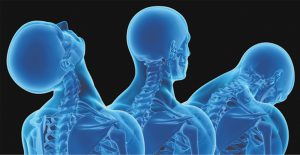By Dr. Michael Shaffer
 Spinal injuries can significantly impact an individual’s life, ranging from temporary discomfort to severe, life-altering conditions. These injuries often require immediate medical attention to prevent long-term complications. Chiropractic management offers care of nonsurgical spinal injuries. This may include spinal manipulation (spinal adjustments), physical therapy modalities, prescribed exercises to restrengthen and rehabilitate, and a review of proper body mechanics. Below, we delve into the various types of spinal injuries and introduce a nonsurgical treatment option known as spinal decompression.
Spinal injuries can significantly impact an individual’s life, ranging from temporary discomfort to severe, life-altering conditions. These injuries often require immediate medical attention to prevent long-term complications. Chiropractic management offers care of nonsurgical spinal injuries. This may include spinal manipulation (spinal adjustments), physical therapy modalities, prescribed exercises to restrengthen and rehabilitate, and a review of proper body mechanics. Below, we delve into the various types of spinal injuries and introduce a nonsurgical treatment option known as spinal decompression.
Common Types of Spinal Injuries
1. Whiplash
Whiplash, clinically called Cervical Acceleration-Deceleration (CAD) injury, occurs when the head is abruptly thrust backward and forward, commonly due to rear-end car collisions. This rapid motion can injure the cervical spine’s muscles, ligaments, tendons, and discs (neck region). Symptoms may include neck pain, stiffness, headaches, and dizziness.
2. Sprains and Strains
A strain involves injury to muscles or tendons, while a sprain affects ligaments. Both injuries can result from overuse, overstretching, or sudden, forceful movements, such as those experienced in car accidents. Symptoms typically include pain, swelling, and reduced range of motion.
3. Slip and Fall Injuries
These injuries, often called slip, trip, and fall accidents, occur due to hazardous conditions like wet floors, uneven surfaces, or poor lighting. Such incidents can lead to fractures, sprains, Strains, and even spinal injuries, necessitating prompt medical evaluation.
4. Repetitive Use or Overuse Injuries
Repetitive use injuries, also known as repetitive motion or stress injuries, are caused by continuous repetitive motions affecting muscles, nerves, ligaments, and tendons. These injuries can impact various body parts, including the back, shoulders, neck, and arms.
5. Sports Injuries
Athletes of all levels are susceptible to sports injuries, ranging from minor sprains and strains to severe fractures and ligament tears. These injuries can involve the spine and/or extremities.
6. Sleep Posture Injuries
Improper sleeping positions can lead to discomfort and injury in various body parts, including the neck, shoulders, back, hips, and knees. Ensuring proper sleep posture and using supportive bedding can help prevent these injuries.
7. Improper Lifting Injuries
Improper lifting techniques can cause spinal injuries ranging from mild strains to severe disc herniation. Proper training in lifting techniques and overall fitness are crucial in preventing these injuries.
8. Work Injuries
Occupational injuries can occur in diverse settings and range from minor cuts to severe accidents causing long-term disability. Common work injuries include repetitive strain injuries, falls, and herniated discs.
9. Tech Neck
“Tech neck” describes the strain and discomfort experienced in the neck and shoulders due to prolonged use of technology devices. This condition results from poor posture, characterized by a forward head position and rounded shoulders, which increases pressure on the cervical spine.
Nonsurgical Spinal Decompression
Non-surgical spinal decompression treatment has been gaining popularity in the United States and worldwide in recent years. It’s a non-invasive treatment that can help relieve back pain and other symptoms by gently stretching the spine and reducing pressure on the spinal discs, nerves, and surrounding structures. It can be used to treat a variety of conditions, including herniated discs, sciatica, degenerative disc disease, spinal stenosis, and facet joint syndrome.
How Nonsurgical Spinal Decompression Works
1. Preparation: The patient is fitted with a harness around their pelvis and another around their trunk. They lie down on a table controlled by a computer to provide precise decompression.
2. Decompression Session: Decompression Session: The table gently stretches the spine, creating negative intradiscal pressure. This process can aid in repositioning bulging or herniated discs and promoting the movement of water, oxygen, and nutrient-rich fluids into the discs, facilitating healing.
3. Duration and Frequency: Each session lasts 30 to 45 minutes. A typical treatment plan may require 20 to 28 sessions over five to seven weeks.
Benefits of Nonsurgical Spinal Decompression
• Pain Relief: Decompression therapy can significantly reduce pain associated with herniated or bulging discs, sciatica, and other spinal conditions.
• Improved Vitality: By reducing disc pressure and nerve compression, patients often experience improved mobility and flexibility.
• Non-Invasive: As a non-invasive treatment, spinal decompression avoids the risks associated with surgery and has minimal recovery time.
• Holistic Approach: Often combined with other therapies such as physical therapy, exercise, and lifestyle modifications for comprehensive spine health.
Consult Dr. Shaffer
Spinal injuries, ranging from whiplash to repetitive stress injuries, can significantly impact daily activities and overall quality of life. Nonsurgical spinal decompression offers a promising treatment option for various spinal conditions, providing pain relief and improved mobility without the risks associated with surgery. If you suffer from spinal pain or injury, consult with call Dr. Shaffer to explore your treatment options and begin your journey to recovery.
Dr. Shaffer has been serving Collier County since 1981. He specializes in spinal care, chronic and acute musculoskeletal conditions, injury, and rehabilitation. Most insurance is accepted as well as auto-accident and work-related injury cases. The staff will review and clarify your coverage. Non-Surgical Spinal Decompression is an elective procedure. To determine if you are a candidate, call for a complimentary consultation. (239) 793-3200.
Rely on Clinical Expertise and Experience
Michael C. Shaffer, D.C., P.A.
(239) 793-3200
www.drmichaelshaffer.com
2663 Airport-Pulling Road South, D104
Naples, FL 34112









